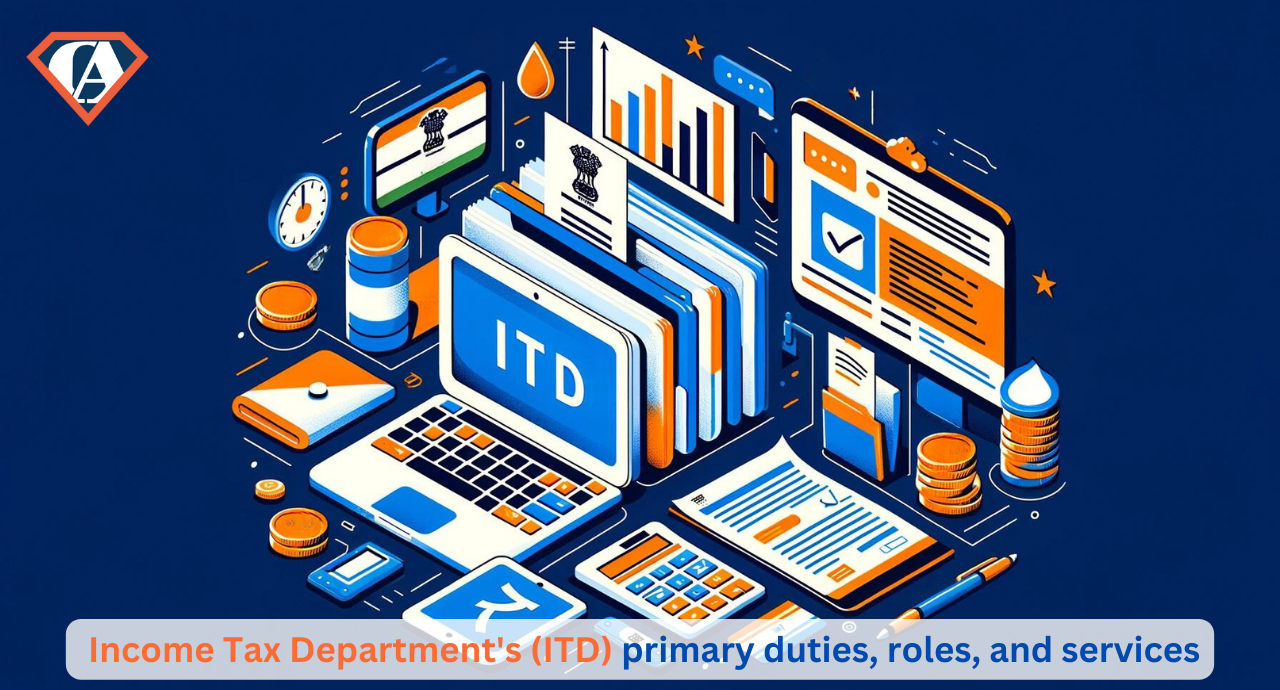Income Tax Department's (ITD) primary duties, roles, and services
- Posted By SuperCA
- On 11 February

Introduction
The Income Tax Department (ITD) of India plays a pivotal role in the nation's economic framework, managing the collection and administration of direct taxes. This blog delves into the primary duties, roles, and services of the ITD, shedding light on its importance in shaping India's fiscal policies and ensuring the financial health of the country.
Primary Duties of the ITD
The ITD is entrusted with several critical duties:
- Tax Collection and Processing: Ensuring efficient collection, processing, and management of direct taxes in India.
- Policy Formulation: Developing policies related to direct taxes and their implementation.
- Taxpayer Services: Providing services to taxpayers for easier compliance and resolution of issues.
These duties are fundamental to maintaining the country's tax infrastructure and facilitating national development.
Roles of the ITD
The Income Tax Department (ITD) fulfills several vital roles within India's fiscal system:
- Regulatory Role: The ITD regulates direct tax laws, ensuring that individuals and entities comply with the Income Tax Act.
- Advisory Role: It advises the government on matters related to direct taxation and its impact on the economy.
- Educational Role: The department also works to educate taxpayers about their rights and responsibilities.
Services Offered by the ITD
The ITD provides a wide range of services to facilitate taxpayer compliance and ease the taxation process:
- e-Filing of Income Tax Returns: Offering an online platform for the electronic filing of tax returns.
- Taxpayer Assistance: Providing assistance through helpdesks, online portals, and customer service centers.
- Refund Processing: Efficient processing of tax refunds to taxpayers.
- Grievance Redressal: Addressing and resolving taxpayers' grievances.
Digital Initiatives and Taxpayer Services
In recent years, the ITD has launched several digital initiatives aimed at simplifying the tax compliance process:
- Aadhaar-PAN Linking: Facilitating the linking of Aadhaar with PAN for streamlined verification.
- e-Assessment: Introducing a faceless assessment system to reduce taxpayer grievances.
- Digital Communication: Enhancing communication with taxpayers through digital channels for notices and documentation.
Compliance and Enforcement
The ITD also plays a critical role in ensuring compliance with tax laws and enforcing them:
- Investigation and Raids: Conducting investigations and raids to uncover tax evasion.
- Penalties for Non-Compliance: Imposing penalties on entities and individuals who fail to comply with tax laws.
- Dispute Resolution: Offering mechanisms for the resolution of disputes related to tax assessments.
Conclusion
The Income Tax Department's (ITD) primary duties, roles, and services are integral to India's economic stability and growth. By ensuring compliance with tax laws, providing essential services to taxpayers, and embracing digital initiatives, the ITD significantly contributes to the nation's fiscal health. These efforts not only aid in efficient tax collection but also in building a transparent and taxpayer-friendly environment.
Frequently Asked Questions (FAQs) About the Income Tax Department (ITD)
Q1: What is the main responsibility of the Income Tax Department?
A1: The main responsibility of the ITD is to collect direct taxes, enforce tax laws, and ensure compliance with the Income Tax Act, contributing to the nation's revenue.
Q2: How can I file my income tax return with the ITD?
A2: Taxpayers can file their income tax returns online through the e-filing portal provided by the ITD or seek assistance from authorized tax return preparers.
Q3: What digital services does the ITD offer to taxpayers?
A3: The ITD offers several digital services, including e-filing of tax returns, Aadhaar-PAN linking, e-assessment, digital communication for notices, and an online grievance redressal system.
Q4: How does the ITD handle tax evasion?
A4: The ITD handles tax evasion through rigorous audits, investigations, and raids on suspected evaders. It also imposes penalties and prosecutes cases of tax evasion to ensure compliance.
Q5: Can I seek help if I have a grievance related to my taxes?
A5: Yes, the ITD provides a grievance redressal mechanism through which taxpayers can submit their grievances online or contact the taxpayer services for assistance.
Q6: Are there any initiatives by the ITD to educate taxpayers?(h3)
A6: Yes, the ITD conducts awareness programs, publishes educational materials, and maintains a helpdesk to educate taxpayers about their rights and responsibilities.
Q7: What measures has the ITD taken to ensure taxpayer convenience?
A7: The ITD has introduced several measures for taxpayer convenience, including simplifying tax return forms, enabling electronic transactions, and offering pre-filled tax return forms to reduce errors and save time.





